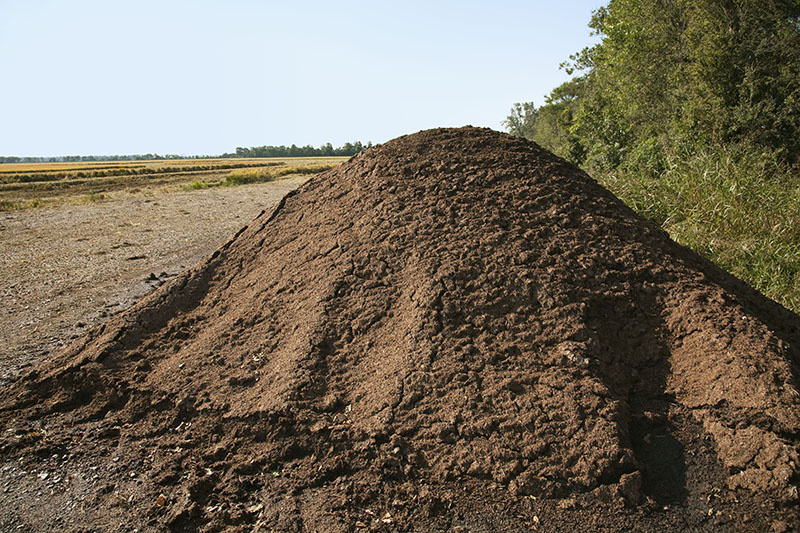
In a decision that campaigners say will have "huge implications" for the handling of manure on farms nationwide, the High Court ruled that chicken manure can be classified as ‘waste’.
Earlier this month, judges said that it cannot be assumed that manure will be used in a way that does not risk harm to the environment simply by the existence of protective regulations such as the Farming Rules for Water.
When, in March 2024, Local Planning Authority (LPA) for Herefordshire Council introduced a new agricultural waste policy 'Policy W3' that required new developments to be ‘nutrient neutral’ in order to protect the local environment against the effects of surpluses, the NFU brought on a legal challenge.
This was on multiple grounds, with the union claiming that:
• Herefordshire Council’s Mineral Waste Local Plan (MWLP) went beyond its remit, unlawfully seeking to control legitimate use of manure.
• The duplication of controls otherwise presented in environmental and permitting legislation was unsound.
• Manure was inappropriately categorised as ‘waste’ rather than ‘by-product’
• The controls of the MWLP sought not only to influence the development of the site but, unlawfully, the activities that eventuated on the site, and the agricultural unit as a whole
• Consultation did not follow due process and, as such, prejudiced the subsequent challenge brought by NFU
Following a two day hearing in December, in which campaign group River Action made representations in support of the Herefordshire Council, the judge this month dismissed all of the principle arguments made by NFU.
The reaction to the verdict
Charles Watson of River Action said the ruling "marks a major victory both for the river Wye and rivers generally across the nation".
He said: "It exposes yet another attempt by the NFU to push back on important initiatives intended to end the blight of agricultural pollution in our rivers.
"We believe the ruling clarifies once and for all that the intensive factory production of livestock is clearly an industrial manufacturing process, whereby the often-toxic waste that it produces must be treated as such.”
Environmental campaigners will likely see the ruling as a precedent for similar protections to be embedded in in all planning applications for livestock production developments.
Carol Day, environment solicitor at law firm Leigh Day said the judgement “should also now mean that proper environmental controls are put in place across the country to oversee the production and handling of manure”

Rachel Hallos, NFU vice president added: “We are extremely disappointed by the High Court’s ruling and are currently reviewing the judgement carefully to examine its potential implications for our members in Herefordshire.
“Today’s decision will come as a further blow to farming’s ability to invest and improve on-farm infrastructure. The NFU is considering whether to seek permission to appeal today’s ruling."
Why is this verdict significant?
There is an important distinction between development itself and activity on that development.
Planning policies shape the development, and separate regulations have controlled the arising activity. In this case, those lines have been blurred and a vital precedent has been set.
Herefordshire Council’s Policy W3 seeks to regulate not only development on the agricultural unit, but also the agricultural activities thereon.
NFU sought to argue that farming practices are sufficiently regulated under specific rules, namely the environmental protection and permitting laws.
The union cited the National Planning Policy Framework 2023, which states “the focus of planning policies and decisions should be on whether proposed development is an acceptable use of land, rather than the control of processes or emissions (where these are subject to separate pollution control regimes).
"Planning decisions should assume that these regimes will operate effectively.”
Referring to the categorised degradation of the River Wye over the past decade, the High Court's Justice Lieven determined that it cannot be assumed that such regimes are working properly, and that the LPA was indeed lawful to make novel provisions for environmental protection in their WMLP.
Of the Farming Rules for Water, the judge said they are “a regulatory regime which beyond any doubt had failed to protect the environment from harm.”
OEP opens investigation into Farming Rules for Water
In the days following the judgement, the Office for Environmental Protection (OEP) launched an investigation into possible failures by Defra and the Environment Agency to comply with the Water Framework Directive (WFD) Regulations, one of the key laws in place to protect water quality.
This follows a report by the OEP into the implementation of the WFD Regulations, published in May 2024, which found that issues with implementation meant key targets for improvement of water bodies by 2027 were highly likely to be missed.
Key issues identified in the report included plans that are too generic and therefore don’t address specific issues at individual sites, and plans being put in place despite low government confidence that their objectives can be achieved.
Defra has formally responded to that report and broadly accepted its findings, but that response did not provide direct assurances that the issues identified would be addressed in a timely manner.
The follow-up OEP investigation will look at whether those issues raised in the report represent failures to comply with environmental law.
If it is determined that there have been such failures, the investigation will aim to accelerate progress to achieving the environmental outcomes for water bodies, inform any changes or developments to legislation, and raise public awareness and participation in the process to improve accountability.
Helen Venn, the OEP’s chief regulatory officer, said: “We are engaged with the Independent Water Commission led by Sir Jon Cunliffe, which will be looking at aspects of the WFD Regulations.
"We await the outcome of the appeal in the case brought by Pickering Fishery Association relating to the correct interpretation of the Regulations, which we intervened in.
“Our aim is for this investigation to be a valuable part of that bigger picture, informing any reforms, changes and actions through clarifying what is required of government under the current regulations, so any issues are not carried forward.
“We are concerned that there is an indication of potential failures to comply with environmental laws which are having negative consequences for water bodies, and this is why the important targets for water quality are likely to be missed."
Ms Venn continued: “Even with all the other activities taking place, none involve firm commitments to address the issues we have identified, and the timeline and extent of any resulting changes are currently uncertain.
"Clarifying the requirements under the current regulations can help drive action to ensure those targets for water bodies are met as quickly as possible.”
What are the implications for farmers?
Locally, with the ongoing legal case against Avara and other associated poultry firms, this ruling will serve to boost the confidence of the litigators.
Leigh Day partner Oliver Holland said chicken manure "is a pollutant and should be managed appropriately".
He said: "This judgement recognises that and it is a significant development both for my clients in the Wye, Lugg and Usk regions.
"They are seeking to hold alleged polluter to account but also in the wider environmental context to ensure that the environment is better protected from intensive farming practices.”
Seeking another perspective, Paul Collins, lawyer at Ashfords LLP, told the British Free Range Egg Producers' Association (BFREPA) that it "remains to be seen how the poultry farming sector in Herefordshire, as well as livestock production generally, will respond."
He said: "The decision also raises the questions of whether other LPAs might draw from Policy W3 in formulating their MWLPs. The decisions is unlikely to be the last word in this legal area.
"The definition of manures as ‘waste’ will likely bring with it a greater burden of responsibility and scrutiny on the producer, as well as commercial implications for anyone trading or handling manures.
"Arguably more significant is the introduction of new case law that affords councils across the land the powers to make supplementary provisions for environmental protection that surpass or duplicate existing regulations."
